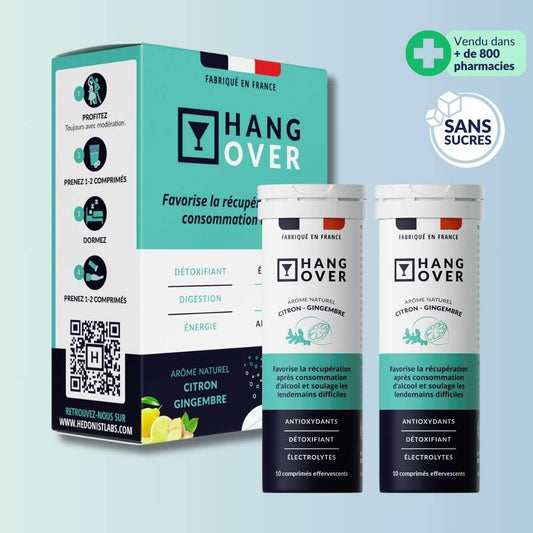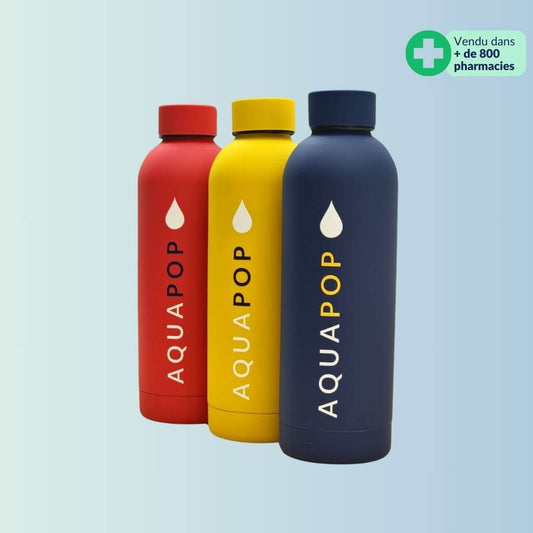The Hédonist Labs team
Should you eat sugar when you're hungover? There's no clear-cut answer...
Good or bad idea to splurge on soft drinks the day after a night of drinking?
Veisalgia, also known as"hangover", is a set of unpleasant symptoms experienced after consuming excessive amounts of alcohol. These symptoms can include headaches, nausea, fatigue and increased sensitivity to light and noise.
Sugar plays an important role in the culture of alcohol consumption, as it is often used to mask the bitter taste of alcohol, making drinks more pleasant to drink. What's more, sugary alcoholic beverages can induce dependence more quickly due to the combined effect of alcohol and sugar on the brain, helping to promote excessive consumption.
The question of whether sugar can help alleviate the effects of a hangover is a complex one. Some believe that consuming sugar can help replenish glucose levels in the body, which may help relieve some hangover symptoms.
However, there is little solid scientific evidence to support this idea, and excessive sugar consumption may even worsen certain symptoms such as headaches and nausea. What's more, the effect of sugar on hangovers can vary between individuals and other factors such as the amount of alcohol consumed and general health.
The effects of a hangover
As a reminder, common hangover symptoms include headaches, often due to dehydration and inflammation of the blood vessels in the brain. Fatigue is also common, as alcohol disrupts sleep and can leave you feeling lethargic the next day.
Nausea is often present due to irritation of the stomach and intestine caused by alcohol. Other symptoms include heightened sensitivity to light and noise, dizziness, dry mouth and reduced concentration and coordination. These symptoms can vary in intensity depending on the amount of alcohol consumed and individual sensitivity.
The physiological mechanisms of hangovers are complex, involving several processes in the body. Alcohol disrupts the balance of neurotransmitters in the brain, notably glutamate and GABA, which affects cognitive function and can contribute to symptoms such as headaches and confusion.
In addition, alcohol has a diuretic effect, which can lead to dehydration and electrolyte disturbances, contributing to fatigue and headaches. Alcohol can also irritate the mucous membrane of the stomach and intestine, leading to nausea and abdominal pain.
In addition, the process of metabolizing alcohol in the liver can generate toxic by-products such as acetaldehyde, which can contribute to hangover symptoms. Finally, inflammation and activation of the immune system in response to alcohol consumption may also play a role in the symptoms experienced.
Hangovers can therefore have a significant impact on well-being and daily performance, leading to reduced productivity, difficulty concentrating, increased irritability, sleep disturbances and a diminished ability to perform physical and mental tasks.
The role of sugar in the recovery process
Sugar can play a role in the recovery process after alcohol consumption in several ways.
It is rapidly absorbed by the body and can provide an immediate source of energy after alcohol consumption. It can also help compensate for the drop in blood sugar associated with alcohol consumption, which can help relieve fatigue and restore energy levels.
- Alcohol consumption can lower blood sugar levels, which can contribute to the tired, weak feeling associated with a hangover. Sugar can help stabilize blood sugar levels and provide a quick source of energy, which can help alleviate some of the symptoms of a hangover.
- But while sugar can provide an immediate source of energy and help stabilize blood sugar levels, its effectiveness in relieving specific hangover symptoms such as headache, nausea and fatigue is variable and depends on many individual factors.
Some people may experience temporary relief after consuming sugary drinks, while others may see no significant improvement.
Alternatives to sugar
- Water : Dehydration is one of the main contributors to hangovers, so drinking plenty of water can help rehydrate the body and relieve symptoms.
- Coffee : The caffeine in coffee can help alleviate fatigue and improve alertness. However, it can also aggravate dehydration, so it's important to consume it in moderation and drink enough water.
- 3. Lnti-inflammatory drugss : Some over-the-counter medications, such as ibuprofen, can help relieve the headaches and body aches associated with hangovers by reducing inflammation.
Compared to sugar consumption, these alternatives offer a number of advantages:
- Water helps rehydrate the body and eliminate toxins, without adding extra calories.
- Coffee can improve alertness and concentration, but can worsen dehydration.
- Anti-inflammatories can effectively relieve headaches and body aches, but they don't treat the underlying causes of hangovers.
It's important to note that excessive sugar consumption can have detrimental effects on long-term health, including contributing to obesity, diabetes and cardiovascular disease.
Consequently, it is advisable to limit consumption of sugary drinks and seek healthier alternatives whenever possible. In addition, the use of anti-inflammatory drugs should be cautious and limited to the recommended dose, as excessive consumption can also have undesirable side effects.
Scientific debate on the effectiveness of sugar in alleviating hangover symptoms persists, with differing opinions as to its true impact. Recent studies on the impact of sugar on recovery from alcohol consumption offer mixed results, highlighting the need for further research to better understand its role.
The limitations of current knowledge underscore the need for more studies to determine more definitively the efficacy of sugar and other interventions in the management of hangovers.
Practical recommendations
To deal with a hangover in a healthy and effective way, here are a few practical recommendations:
- Hydration: Drink plenty of water to rehydrate your body and help eliminate toxins. Avoid caffeinated drinks, as they can aggravate dehydration.
- Nutrition: Opt for light, balanced meals to help stabilize blood sugar levels and provide essential nutrients for your recovery.
- Rest: Give yourself sufficient rest and sleep to allow your body to recover.
- Avoid additional alcohol: Avoid drinking more alcohol to relieve hangover symptoms, as this will only make the situation worse.
- Prevention: Limit your alcohol consumption and drink responsibly to reduce the risk of hangovers. Set limits for yourself and stick to them.
In conclusion, while sugar can provide an immediate source of energy and help stabilize blood sugar levels, its effectiveness in relieving hangover symptoms can vary from person to person. An individualized, balanced approach to managing the effects of alcohol consumption and hangovers is essential.
In the final analysis, we recommend focus on adequate hydration, balanced nutrition, rest and prevention strategies to limit excessive alcohol consumption and reduce the risk of hangovers. Everyone should listen to their bodies, understand their own reactions to alcohol and adopt responsible drinking behaviors.





